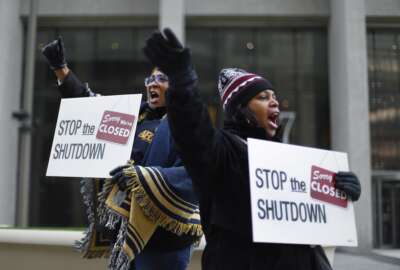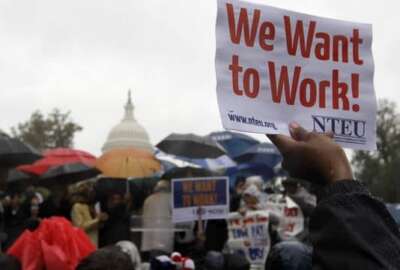

Federal district Judge Richard Leon acknowledged the potential for precedent with NTEU's lawsuit if he denies the motion to dismiss the case, which challenges the...
A federal district judge has decided to hear the government’s proposed motion to dismiss a lawsuit challenging the Trump administration’s handling of the recent government shutdown brought to the D.C. district court by the National Treasury Employees Union.
Judge Richard Leon met with both parties Friday afternoon to discuss the path forward for NTEU’s lawsuit, filed in the U.S. District Court for the District of Columbia, now that the recent 35-day government shutdown has ended.
Justice Department attorneys representing the federal government said Friday they preferred to dismiss the case altogether, arguing that NTEU’s challenges were “moot” now that the most recent government shutdown had ended and the threat of another one — at least for the time being — is over.
But NTEU, along with the attorneys who are representing four anonymous federal employees in a similar but separate lawsuit against the Trump administration and its actions during the recent government shutdown, said they’ve raised constitutional arguments that should be resolved.
“It’s over until the next one,” said Michael Kator, an attorney with Kator, Parks, Weiser and Harris, the law firm representing the four anonymous employees.
Leon said he wants both parties to agree to a timeline where they could both do oral arguments some time in early May, noting that if he denies the motion to dismiss, he may be in a position where he’s forced to consider summary judgment on the case much closer to the next government shutdown deadline.
“I don’t want that to drag too close … to the end of the fiscal year,” Leon said.
If he does deny the motion to dismiss the case, he envisioned a scenario where both parties appeared again before the court over the summer to deliver oral arguments. His opinion could come in early September, just shy of the end of the fiscal year on Sept. 30.
“It’s a case that has great potential to concern and impact the country,” Leon said, noting that it could, if it moves to this stage, hold precedent.
NTEU’s legal arguments are nuanced, but they essentially challenge the heart of the very mechanism that ultimately prompts agencies to shut down, furlough some and force other federal employees to work without pay for the duration of a lapse of appropriations.
First, NTEU argued that the Antideficiency Act, which essentially prohibits agencies from spending money they don’t have, violates the appropriations clause of the U.S. Constitution. The appropriations clause directs agencies to spend obligated funds only if Congress has appropriated such funds.
Second, the union claimed OMB guidance that instructs agencies to obligate certain employees to come to work during a government shutdown violates the Antideficiency Act.
Because the act prohibits agencies from spending money they don’t have, those organizations can’t require certain employees to perform services they can’t be paid for, NTEU argued.
NTEU first filed these challenges in mid-January. It added a third count later, which protested the Trump administration’s recall of tens of thousands of federal employees who are returning to work without pay during the partial government shutdown.
Specifically, the third count challenged the administration’s decision to recall more than 46,000 IRS employees back for work without pay. NTEU argued the IRS employees, who will return to work to process tax refunds and perform certain customer service functions, are not considered “excepted employees.”
The Trump administration recalled tens of thousands of federal employees across government during the most recent shutdown. Employees from the Agriculture Department and Federal Aviation Administration, among others, also returned to work at various points throughout the 35-day government shutdown.
The Trump administration, however, argued those decisions were simply attempts to find legal interpretations and workarounds to the Antideficiency Act and alleviate the impacts of the government shutdown to the American public.
NTEU also filed another lawsuit, which is similar to those that several other federal labor organizations have brought to the U.S. Court of Federal Claims.
Those lawsuits argue that requiring excepted employees to work without pay during the government shutdown violates the Fair Labor Standards Act.
The American Federation of Government Employees and National Federation of Federal Employees were among those who filed class-actions lawsuits with this argument.
AFGE made a similar argument during the 2013 shutdown and won.
The most recent government shutdown delayed deliberations between an independent consultant and the attorneys representing the federal plaintiffs who are still determining a methodology for calculating back pay damages.
The parties on Thursday submitted their most recent status report documenting this work. The attorneys are still working with agencies to quickly gather necessary payroll data for the impacted employees.
Copyright © 2025 Federal News Network. All rights reserved. This website is not intended for users located within the European Economic Area.
Nicole Ogrysko is a reporter for Federal News Network focusing on the federal workforce and federal pay and benefits.
Follow @nogryskoWFED



